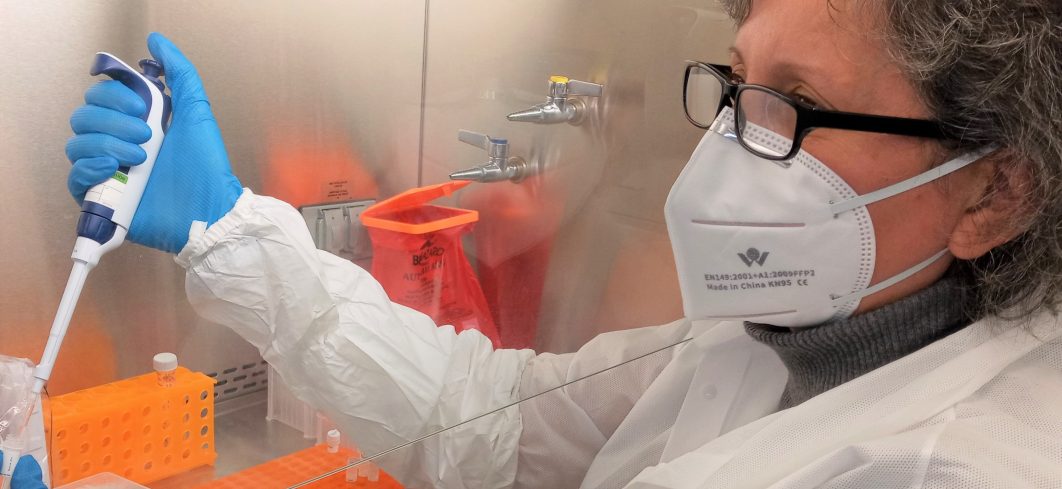Caldwell University
June 1, 2021
Science Professor Brings COVID Research Work to Classroom

When Professor Agnes Berki signed up for her fall 2020 sabbatical she thought she would be studying microbiology to help develop her own research on asthma. For years she had wanted to focus on illnesses caused by bacteria and fungi, especially asthma. “The treatment is still symptomatic,” says Berki of the chronic condition. She knew she had a niche that was worthy of study and something she could bring back to her students in the School of Natural Sciences at Caldwell. But then March 2020 happened: COVID-19, lockdowns, the pandemic. SARS-CoV-2 bulldozed its way into the center seat of science, public health, medicine, technology, and society.
Overnight the plans for Berki’s sabbatical work at the Brooklyn-based health tech company Biota Inc. switched to COVID-19 research, which included monitoring the mutations of the virus through laboratory techniques and contributing to literature research and publication writing. She was happy to use her science background and research experience to learn and to “actively do something,” especially at a time of anxiety when many felt paralyzed.” Her days included learning the novel technique of next-generation sequencing. “This enables one to look at the sequence of the genetic material of the virus since there are over 6,600 locations in the genome that are mutated, giving rise to more than 82,000 reported different kinds of mutations in this virus,” explains Berki, associate professor of natural sciences.
In the lab, she was grateful to be at the center of such critical research as she performed the protocol of next-generation sequencing and RNA extraction. “Good RNA extraction is the key for other tests and studies,” Berki says. She also contributed to researching genetic mutations and understanding their effect on proteins and virus function. Berki became one of the authors of an article on mutation analysis of the COVID-19 virus, SARS-CoV-2, titled “Targeted Hybridization Capture of SARS-CoV-2 and Metagenomics Enables Genetic Variant Discovery and Nasal Microbiome Insights,” which has been submitted for consideration for publication in a journal.
Biota Inc. was launched as part of Jacobs Technion-Cornell Institute at Cornell Tech in association with Weill Cornell Medicine. The company uses DNA sequencing-based technology and proprietary AI-powered software to accurately identify microorganisms and antimicrobial resistance. Berki was grateful to be on site where she not only learned and performed experiments but also had intellectually stimulating conversations and networked with colleagues at Biota and with members and scientists from the International AIDS Vaccine Initiative and ChemitopeGlycopeptide LLC, located on the same floor.
This spring Berki was happy to be back in the classroom at Caldwell sharing with the students in her cell biology, immunology, and other classes what she learned—“the knowledge of the virus, its genetics, and the COVID-19 antibody testing.” In particular she has confidence that she is giving the students contemporary practices in lab research, documentation and tracing and the way of working in a controlled environment, known as “current good laboratory practices.”
On March 11 Berki presented at the Caldwell University chapter of Phi Kappa Phi event on “COVID-19 Variants and Their Relevance in Combating the Pandemic”.
She looks forward to bringing students to the Biota site in Brooklyn. “They have generously offered to assist us in projects allowing us to use their instrumentation.” Because Biota is a growing company, she hopes her experience will open doors for Caldwell biology, chemistry, and computer science students for research, internship, and job opportunities with the firm.
Before joining Caldwell as a faculty member, Berki worked in microbiology, molecular biology, protein chemistry, and cancer research. She was employed as a senior scientist in R&D at Schering Plough in Union, New Jersey, and as a virologist and deputy of the virology department at Gibraltar Laboratories in Fairfield, New Jersey. She earned a Master of Science degree in chemistry, physics, and education from the University of Debrecen in her native Hungary and a Ph.D. in pharmaceutical sciences and molecular biology from the University of Maryland at Baltimore. She conducted research on GI cancer for her postdoctoral work at the University of Maryland Medical Center.
Since COVID-19 has taken such a toll on society, beyond scientific knowledge, Berki hopes what she learned on her sabbatical helps Caldwell students educate their families and friends. “I’m excited to bring to the classroom more of an awareness of the dangers of the virus and how we can protect ourselves and our loved ones.”
As for her asthma studies, as a woman of faith and reason she hopes the day will come for that work. “It is in my heart to do that research.”





